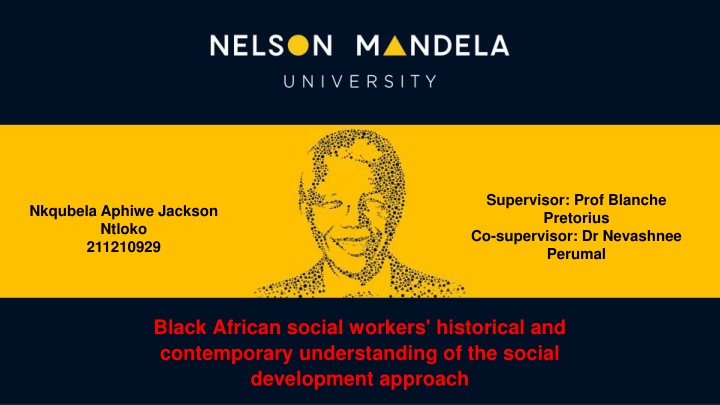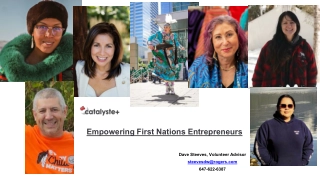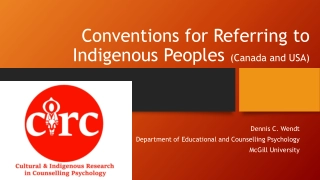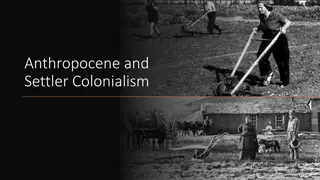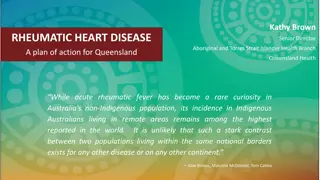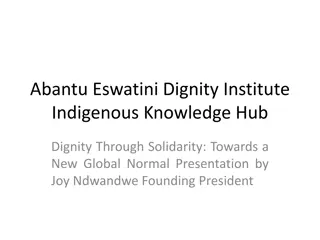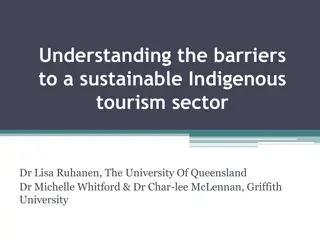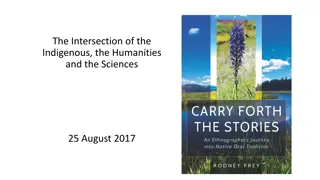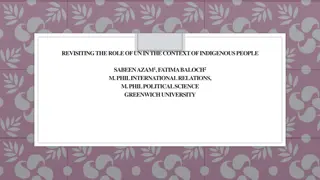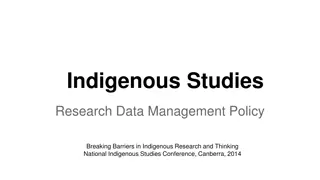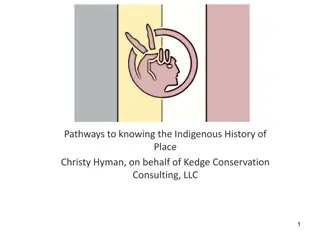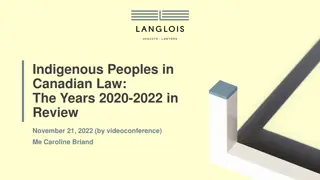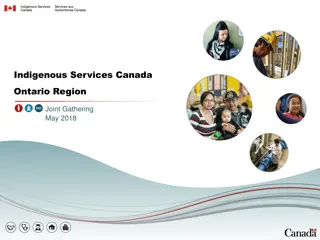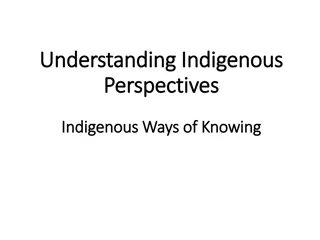Social Development Challenges in South Africa: Embracing Indigenous Knowledge
South Africa's social welfare policies have been influenced by colonialism and apartheid, leading to a disconnect between Western social thought and indigenous African practices. This study aims to empower Black Africans in the social work sector, promoting the integration of indigenous knowledge systems to address poverty and inequality effectively.
Download Presentation

Please find below an Image/Link to download the presentation.
The content on the website is provided AS IS for your information and personal use only. It may not be sold, licensed, or shared on other websites without obtaining consent from the author.If you encounter any issues during the download, it is possible that the publisher has removed the file from their server.
You are allowed to download the files provided on this website for personal or commercial use, subject to the condition that they are used lawfully. All files are the property of their respective owners.
The content on the website is provided AS IS for your information and personal use only. It may not be sold, licensed, or shared on other websites without obtaining consent from the author.
E N D
Presentation Transcript
Supervisor: Prof Blanche Pretorius Co-supervisor: Dr Nevashnee Perumal Nkqubela Aphiwe Jackson Ntloko 211210929 Black African social workers' historical and contemporary understanding of the social development approach
BACKGROUND AND CONTEXT Colonialism and apartheid shaped the evolution of the nature, form, and content of social welfare policy in South Africa. The introduction of social work was critical as a tool for social control and entrenchment of oppression of the African population. Social work has not been immune to criticism about its relevance to the African context. It remains trapped in the colonial influence, which still shapes social work training and practice in most African countries.
"each group mustattain its style of existence without encroaching on or being thwarted by another Africa must inevitably exhibit African values and be truly African in style"
BACKGROUND AND CONTEXT Social welfare approaches in South Africa: Residual Institutional Social development approach Once political independence was attained in South Africa in 1994, the White Paper for Social Welfare (1997) was adopted. Even though it brought significant changes from the previous system of separate development, it was not foregrounded on indigenous knowledge systems, culture and African practices.
PROBLEM STATEMENT South Africa is one of the world's most unequal societies and the gap between the affluent and the poor is predicted to increase further. Most social welfare beneficiaries in South Africa are Black and Western social thought as a foundation for social development is primarily ineffective and detached from cultural and contextual issues. The social development approach is not grounded on indigenous knowledge systems, culture, and traditional intellectual African practices. The thinking in social development remains a Eurocentric agenda, and the contribution of indigenous contextual ideologies has been neglected.
PROBLEM STATEMENT Social work and social development in South Africa has not made a major impact in addressing large-scale poverty. The distinct feature of this study is to free Black Africans from the shackles of oppression, epistemic injustice and domination by the West. Africans must take centre stage in voicing their views, as they were long silenced through the history of colonisation. The study seeks to allow Black African social work educators, practitioners and community reconfigure the basis of the profession embed indigenous knowledge systems. members to reimagine and
RESEARCH AIM AND OBJECTIVES The study's goal is to co-construct an Afrocentric social work practice approach for relevance in South Africa. To participatively, explore and describe social workers' historical and contemporary social development conceptualisations. To collaboratively explore social work educators perspectives of the social development approach. To explore social workers perspectives of an Afrocentric social work practice approach. To collaboratively explore community members perspectives on the benefits of social services within their communities. To co-construct elements of an Afrocentric social work practice approach in South Africa that foregrounds indigenous perspectives.
THEORETICAL AND CONCEPTUAL FRAMEWORKS The research has used Critical Social Work and Africanism categories, Afrocentrism, Africana Existential Philosophy, and Post-Colonial Theory as theoretical and philosophical grounding. The selected theories were chosen as they aim to place Africans at the centre of their development. They are also aligned with the Participatory Action Learning and Action Research (PALAR) methodology applied in the study. This study was conceptualised using participatory action learning action research (PALAR). PALAR is situated within critical, transformative, and democratic research methodology.
RESULTS SUMMARY Social development has a conceptual ambiguity and varied understanding, and its implementation is diverse. It is informed by Western social thought and lacks indigenous knowledge systems and local practices. It is multifaceted and differs from one practitioner to another, influenced by time, geography, and our diverse discipline orientations and traditions. The varied understanding and implementation of the social development approach contributes to distorted development and is not embedded within communities. It is not as empowering as it ought to be, and the introduction of social work in South Africa was a copy and paste of western social work. It remains incompatible with the indigenous African values systems and hence the call for an Afrocentric turn.
SOCIAL DEVELOPMENT IS MULTIFACETED SOCIAL DEVELOPMENT IMPROVES QUALITY OF LIFE Social development is a participatory process of planned social change intended to champion and realise the well-being of the people and address the felt needs and aspirations of the whole population to improve their quality of life (Cox, Gamlath, & Pawar, 1997). Participant 1: Mna I would say ifocus yayo is for poor people to better their lives. Mostly they look at the poor people because they offer izinto for the people like food, groceries mhlawumbi that s why ndisithi ifocus yabo kakhulu idarekhthe kubantu abapoor xa ndijongileyo mna.
SOCIAL DEVELOPMENT INCLUDES SUSTAINABLE CHANGE Sustainable social development is an integrated process of building human capacity to fight poverty and create sustainable change in their lives. For example, Participant 1 noted that, So, it says you provide you do for the person, and then kwi perspective ka development then it shifted now, to ngokwe theory that you develop the person, you empower the person so that the person can be able to sustain or do things for herself.
RESULTS Social development has not been effective in addressing structural inequalities in South Africa: Poverty, inequality, and access to land Human settlement Unemployment Racism Economic development Empowerment Social justice
RESULTS Participant 14: In my input into this is that it has not been able to address social issues such as unemployment currently and then and therefore for that reason I lean strong to the thinking and the argument that the framework is not addressing some of the major challenges that we are faced with in South Africa, and we can talk about this in a complex approach, again with in relation to poverty, social inequality. Participant 14: In my view social development has not managed to address that, why are we still having a high number of growing individuals who are unemployed, constrained economy, high rate of poverty, inequalities that are visibly clear, that we could all see?
RESULTS Participant 15: Because, umm, we know that where our people are like the black population is it's where the service delivery is lacking. So, if we talk about empowerment and all that, it's difficult for them to access you know the very services now if we talk about social workers and so on, there are very limited social services even the... And the focus will be on grants and this and that, not the actual development.
RESULTS Participant 16: Our profession was transported from the European countries to the newly colonized society, particularly in Africa, Asia, and so on. So, this the problem is that the knowledge was never interrogated. And then social work was meant for only white people in South Africa because of the poor white problem. When we came to the to the democratic dispensation, the knowledge systems. Were not interrogated and changed. It therefore means that the social work, profession and practice continues with the status quo to make sure that everything remains the same. So that is why social work as a profession, and social work as a practice, it's not effective in terms of tempering with the status quo.
SOCIAL DEVELOPMENT IS INDIVIDUALISTIC AND NOT COMMUNITY DRIVEN: As a social welfare approach in South Africa, social development should not be individualistic, and rather be informed by Afrocentric episteme. Individualistic ideologies informed social work's inception, including social development as the strategy to achieve social welfare. Participant 2: You see I m thinking. Nam ndicing into yokubana the Social Development approach is looking at developing the person in an individualism.
SOCIAL DEVELOPMENT IS INDIVIDUALISTIC AND NOT COMMUNITY DRIVEN: Participant 10: uSocial Development approach nesimenza ngayo because in most cases from my experience it was not contextual. It did not relate to the values zale community I was trying to help abantu khona. It didn t relate to the values zabantu aba ndisebenza nabo. Participant 1: The intention does it speak because I think in Africa as an African, I come from the society before the individual, so we need to empower the individual then the society already that is upside down for me.
RESULTS SOCIAL DEVELOPMENT IS REMEDIAL, AND SERVICES ARE NOT INTEGRATED: The development approach that ought to be embedded in social development is not visible in practice, as social development still perpetuates dependency and charity. Participant 9: Look at just this R350 grant situation to add to what Nomonde was saying earlier akukho mntu wenza iineeds assessment, so what are your needs? Is this sufficient? So, a lot of people the grant are saying we don t want the grant. There is no employment opportunities, we want employment opportunities to be self-reliant.
SOCIAL DEVELOPMENT IS REMEDIAL, AND SERVICES ARE NOT INTEGRATED: Participant 3: Social development through social security; social grants they are not developing people, people eating the money then what? So, their strategy whatever yes, they came up with it I don't know it was part of their strategic planning whatever but those programs they are having there are not benefitting people.
CONCLUDING REMARKS It is undeniable that various socio-political and economic factors influence the diverse understanding and implementation of the social development approach. Social development as an approach to social welfare and as practised by social workers is informed by Western social thought and lacks indigenous knowledge systems and local practices. With its multifaceted nature, social development remains incompatible with the indigenous African values systems and hence the call for an Afrocentric turn. Afrocentric social work is based on indigenous knowledge systems, cultural experiences, African values systems, and interpretations that people of African heritage share. Afrocentric social work aims to empower, grow, change, and develop the African person as a whole.
